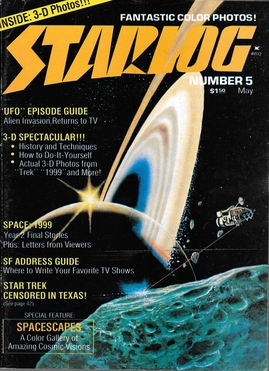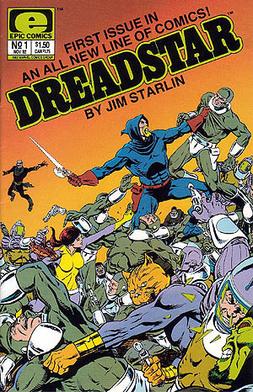
Heavy Metal was an American science fiction and fantasy comics magazine, published between 1977 and 2023. The magazine was known primarily for its blend of dark fantasy/science fiction, erotica, and steampunk comics.

Mickey Mouse Adventures was a Disney comic book first published by Disney Comics from 1990 to 1991. It featured Mickey Mouse as the main character along with other characters from the Mickey Mouse universe. Somewhat similar in style to the animated series DuckTales, it was based on the continuity of earlier print material starring Mickey, mainly Floyd Gottfredson's stories in the Mickey Mouse comic strip.
Twilight Zone literature is an umbrella term for the many books and comic books which concern or adapt The Twilight Zone television series.

Futurama Comics is a comic book series based on the television show Futurama published by Bongo Comics. It has been published bi-monthly in the United States since November 2000. It has been published in the United Kingdom and Australia since 2002 and four trade paperbacks have been released. During the production hiatus between 2003 and 2006 and from 2013 to 2023, with few exceptions, it was the only new Futurama material being made. The comic book series continues its run, even after two cancellations of the TV series. Issues #82 and #83 were distributed via the Futuramaland app, and will not be physically printed.
Steve Moore was a British comics writer.
The Overstreet Comic Book Price Guide is an annually published comic book price guide widely considered the primary authority on the subject of American comic book grading and pricing in the hobby/industry. Numerous observers connect the expansion of the direct market distribution system and the proliferation of comic book specialty shops to the broader recognition and acceptance of Overstreet's annual guide. This guide is considered a standardized inventory and pricing system within the comic book industry.
Godzilla has appeared in a range of comic books that have been published in Japan and the United States.

Comics Revue is a bi-monthly small press comic book published by Manuscript Press and edited by Rick Norwood. Don Markstein edited the publication from 1984 to 1987 and 1992 to 1996.

Starlog was a monthly science fiction magazine that was created in 1976 and focused primarily on Star Trek at its inception. Kerry O'Quinn and Norman Jacobs were its creators and it was published by Starlog Group, Inc. in August 1976. Starlog was one of the first publications to report on the development of the first Star Wars movie, and it followed the development of what was to eventually become Star Trek: The Motion Picture (1979).
There have been four main publishers of the comic book series bearing the name Transformers based on the toy lines of the same name. The first series was produced by Marvel Comics from 1984 to 1991, which ran for 80 issues and produced four spin-off miniseries. This was followed by a second volume titled Transformers: Generation 2, which ran for 12 issues starting in 1993. The second major series was produced by Dreamwave Productions from 2002 to 2004 with multiple limited series as well, and within multiple story continuities, until the company became bankrupt in 2005. The third and fourth series have been published by IDW Publishing with the third series starting with an issue #0 in October 2005 and a regular series starting in January 2006 to November 2018. The fourth series started in March 2019 with issue #1 and concluded in June 2022. There are also several limited series being produced by IDW as well. Skybound Entertainment began publishing Transformers comics starting in June 2023, kicking off the Energon Universe. In addition to these four main publishers, there have also been several other smaller publishers with varying degrees of success.
Inferno! was a bi-monthly magazine published from 1997 to 2004 by Games Workshop's publishing division, Black Library, which was initially just the name of the team brought together to work on Inferno!.

Creepy was an American horror comics magazine launched by Warren Publishing in 1964. Like Mad, it was a black-and-white newsstand publication in a magazine format and did not carry the seal of the Comics Code Authority. An anthology magazine, it initially was published quarterly but later went bimonthly. Each issue's stories were introduced by the host character, Uncle Creepy. Its sister publications were Eerie and Vampirella.
Planet of the Apes comics are tie-ins to the Planet of the Apes media franchise. They have been released by several publishers over the years and include tie-ins and spin-offs.

DC Universe Presents is the name of two DC Comics publications. The first was part of the UK 'Collector's Edition' line of DC Comics published by Titan Magazines. Beginning March 2007, it was originally titled Superman Legends and was published alongside Batman Legends. Titan also later released several other DC comics following on from the success of Superman and Batman Legends. The book was retitled as DC Universe Presents at issue 33 but continued the issue count of Superman Legends, despite the change in title and in some of its content. The title reprinted DC Comics from the United States including Justice League, Superman and Green Lantern and was edited by Mark McKenzie-Ray.

Dreadstar was the first comic-book series published by American publisher Epic Comics, an imprint of Marvel Comics, in 1982. It was centered on Vanth Dreadstar, sole survivor of the entire Milky Way galaxy, and an ensemble cast of crewmates, including cyborg sorcerer Syzygy Darklock, and their struggle to end an ancient war between two powerful, evil empires: The Church of The Instrumentality, run by the Lord Papal; and the Monarchy, administered by a puppet king.
Comic books have been an integral and popular part of the American rock group Kiss' merchandising since 1977, beginning with their appearance in Marvel Comics' Howard the Duck #12. Over their career of nearly four decades, Kiss has licensed their name to "more than 3,000 product(s). .. to become nearly a one-billion-dollar brand."
Jay Allen Sanford is an American author and cartoonist best known for his work with Revolutionary Comics, Carnal Comics, and Pacific Comics. He began writing the comic book Rock ‘N’ Roll Comics in 1989 as of the title's second issue, and still oversees the rock comic reprints published by Bluewater Productions and others. The publishing company he co-founded, Carnal Comics, is best known for launching the movie and cartoon character Demi the Demoness. Sanford ran Carnal Comics from 1994 through 2000, before handing over the publishing reins to SS Crompton.
Transformers Comic was a British comic book series based on the Transformers toyline and film series, published monthly by Titan Magazines from 2007 to 2014. It initially featured strips re-printed from American comics and graphic novels, but later included original comic strips. The first issue was published in July 2007 to tie-in with the release of the Transformers feature film. The comic went through five different volumes and title changes before the final issue was published in August 2014 after a run of seven years.
Rob Davis is a British comics artist, writer, and editorial illustrator located in Blandford Forum, Dorset. He has contributed to Roy of the Rovers, Judge Dredd, Doctor Who Magazine and Doctor Who Adventures. He has also created the graphic novels Don Quixote and a trilogy of original graphic novels, beginning with The Motherless Oven.







